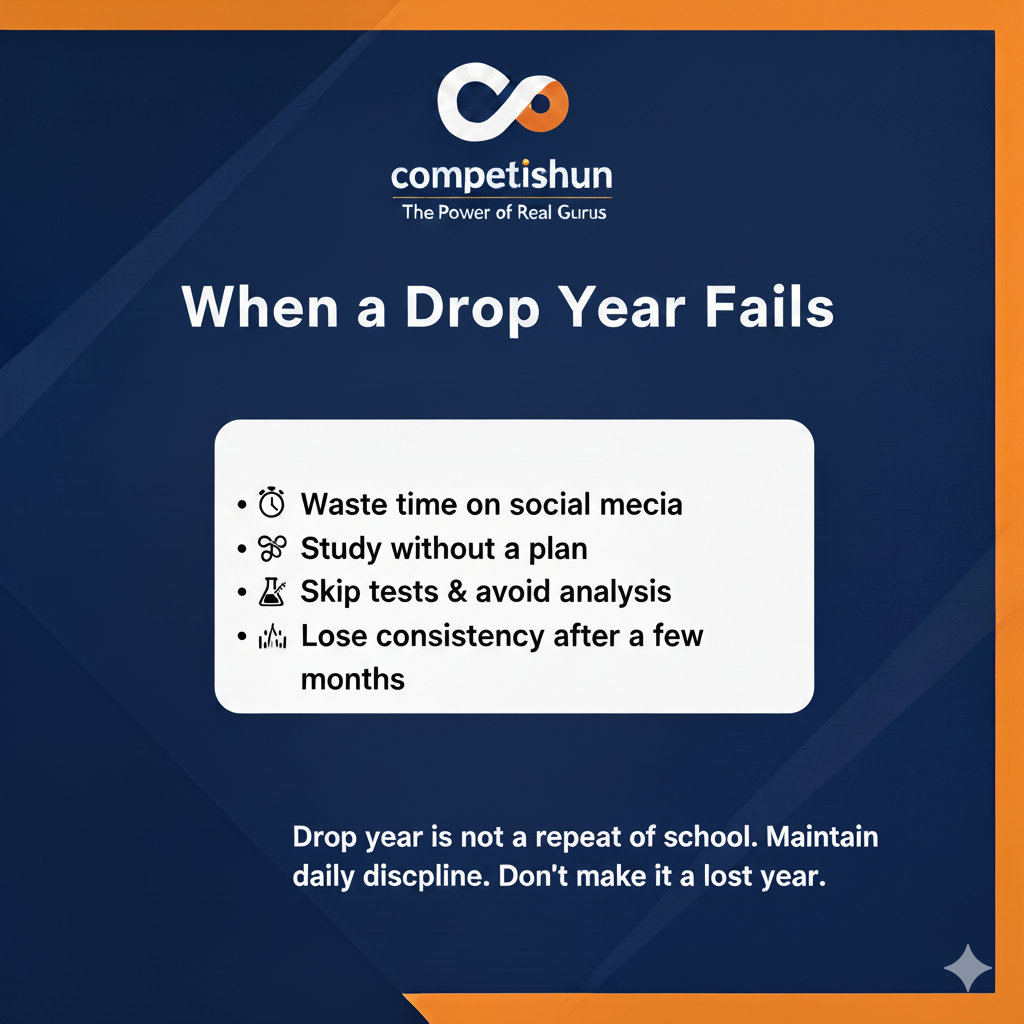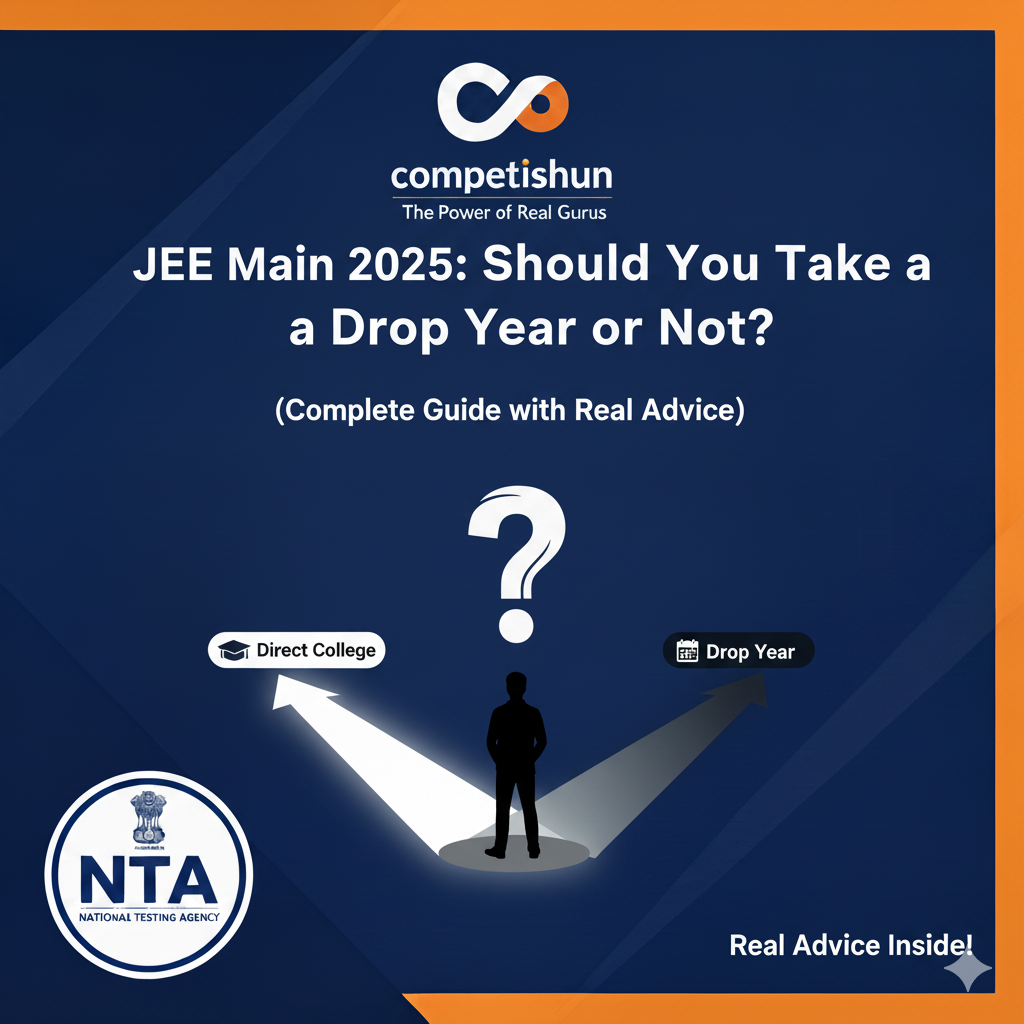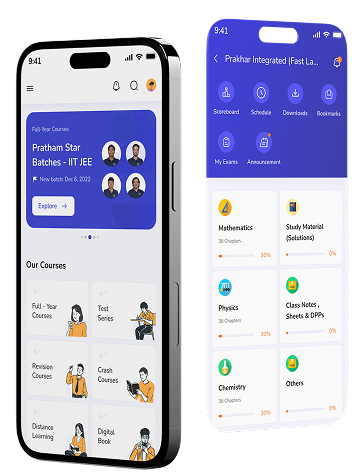The Big Question After JEE Main 2025
So, the results are out. You’ve checked your score again and again, maybe even refreshed the page, hoping it might change. But now the real question begins, “Should I take a drop or move on?”
You’re not alone. Every year, thousands of students ask the same question on WhatsApp, Telegram, and YouTube. Some are confused, some are scared, and some are quietly hopeful. Taking a drop after JEE Main feels like standing at a crossroad. One path leads to a fresh attempt, the other to college life.
Let’s talk clearly and calmly. This guide will help you understand when taking a drop makes sense, and when it doesn’t. We’ll keep it simple, no fancy talk, no false motivation, just honest and friendly advice.
What Does ‘Taking a Drop’ Really Mean?
Before you decide, you must understand what “taking a drop” really means.
It’s not just repeating one more year. It’s choosing to dedicate the next 400 days with full focus, no distractions, and no excuses.
It’s not a break year. It’s a work year.
It means fixing everything that went wrong earlier, your basics, your routine, and your mindset.
Many students think, “I’ll just take a drop and automatically do better.” That’s not how it works. A drop only helps when you use it wisely.
Is Dropping Worth It? When It Can Work
Yes, a drop can change your life, but only if you truly work for it.
Let’s look at a few real examples.
- Last year, a student with a 1 lakh rank decided to drop. He stayed consistent for a full year, fixed his weak topics, and scored around 7,000 rank on the next attempt. That’s a huge jump.
- Another student was around 70,000 rank before, but this year, after proper planning and regular mock tests, he reached the 6,000–7,000 range.
So yes, when done right, dropping can take you from an average score to an IIT-level rank.
But if you think just sitting at home and studying “sometimes” will help, it won’t. Dropping only works when you turn every single day into a serious effort.
When a Drop Year Fails
Now, let’s look at the other side.
There are many students who take a drop but end up scoring even lower. Why does this happen?
Simple reasons:
- They waste time on social media, thinking there’s still “a lot of time.”
- They study without a plan.
- They skip tests and avoid analysis.
- They lose consistency after a few months.
One of the biggest mistakes is treating a drop year like a repeat of school. It’s not.
This year decides how much you grow not just in marks, but in maturity and focus.
If you can’t maintain daily discipline, a drop year can become a lost year.

Who Should Take a Drop? (The Green Signals)
Now let’s see when a drop makes real sense.
1. You’re Ready to Work Hard for 400 Days
If you can study seriously for 10–11 hours every day, attend all lectures, and solve problems daily, you have the right mindset.
A drop year needs long, consistent effort, not random energy bursts.
If this idea excites you, then dropping could be right for you.
2. You Know Exactly What Went Wrong
Ask yourself: “Why didn’t I perform well this year?”
Was it because you didn’t revise? Or skipped tests? Or maybe watched lectures but didn’t practice enough?
If you can clearly identify your mistakes, you can fix them in the next attempt. Self-awareness is your biggest advantage.
3. You Have a Clear Roadmap
You already know in which chapters you’re weak and what your study schedule should be, and how you’ll track your progress.
You understand that there will be bad days, but you’ll still continue.
That’s the spirit of a successful dropper.
4. You’re Healthy and Have a Supportive Environment
Dropping needs peace of mind. A quiet study space, understanding parents, and good physical health are must-haves.
If your home is noisy, full of distractions, or your health isn’t stable, the journey will be very hard.
5. You Were Underprepared Earlier (e.g., Hindi Medium or Late Starter)
If you hardly studied JEE topics during 11th and 12th or didn’t get proper coaching before, a drop can help you cover everything from zero.
Many students from Hindi medium schools use their drop year to fully understand JEE-level concepts and succeed beautifully.
Who Should Not Take a Drop? (The Red Flags)
Let’s be honest, not everyone should drop.
1. You Can’t Maintain Discipline or Routine
If you struggle to sit for long hours, then skip study days often, or lose focus easily, a drop won’t help you.
This year is about consistency, not comfort.
2. You Blame Others for Your Result
If your first thought is “the paper was unfair,” “teachers didn’t teach properly,” or “the system is bad,” then dropping again won’t fix that.
A new year only works if you take full responsibility.
3. You Still Don’t Know How to Study
If even after a full year of preparation, you’re unsure how to plan, take tests, or manage subjects, then you should not drop immediately.
Maybe join college, learn better habits, and prepare side by side.
4. You Already Gave Your 100%
If you truly worked hard in 11th and 12th, gave your best, stayed disciplined, and still didn’t reach your target, maybe JEE isn’t your right path.
That’s okay. There are many other fields where you can shine.
Moving on is also a smart decision.

How to Plan a Drop Year Smartly (If You Decide To Take It)
So you’ve decided to drop. Great, now plan it right.
The 400-Day Strategy
Think of your drop year as a 400-day mission. Every day counts.
Here’s a simple pattern you can follow:
- Daily: Study 10–11 hours divided between Physics, Chemistry, and Math.
- Weekly: Give at least one full syllabus test and analyze mistakes.
- Monthly: Track your progress, which topics are strong, and which still need work.
Stay Consistent
Don’t go too fast in the first month. Study steadily every day, even when you don’t feel like it.
That’s how real progress happens.
Avoid Distractions
Social media, gaming, and long calls, all these can look harmless, but they’re slowly eating your time.
Keep your focus fixed on your goal.
Will a Drop Year Affect Placements or College Life?
This is a common fear. But here’s the truth: companies don’t care if you took a drop.
They look at your skills, not when you cleared JEE.
If you perform well in your degree, placements will never be a problem.
What matters more is your learning attitude, communication, and problem-solving ability.
Final Advice: Decide With Honesty, Not Emotion
If you’re ready to get a rank from 1 lakh to 10,000 through honest effort, then go for the drop.
But if you feel tired, confused, or unsure, then joining a college and moving forward is perfectly fine.
Both paths can lead to success. The key is to be honest with yourself.
Don’t take a drop just because others are doing it. Don’t avoid it just because it’s hard.
Do what feels right after thinking calmly.


